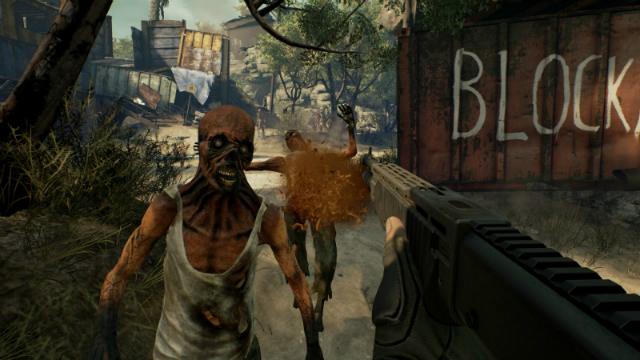The Walking Dead made zombies cool again, but did it do much for the zombie race? Did it expand their purpose as a species? What about their rights? Moving Hazard developer Psyop Games certainly haven’t quit the practice of subjecting zombies to obscene levels of violence, carnage, and destruction. But at least everyone’s favorite foot-dragging undead now have some sense of purpose as meatbag agents of PvP death and destruction. It’s not ideal, but it’s a start!
Moving Hazard features a smattering of multiplayer modes, but my demo focused mainly on classic 2v2 King of the Hill. Though a bit disheartened by this at first, I soon realized why it was a good idea—it’s not about the name of the mode, but how you go about working within its boundaries (and bending them) for your own exploitation of zombies and subsequent victory over your opponent. Your very-much alive and very-much sentient Undead Warlock from WoW simply would not appreciate such treatment of his kind. But enough about that.
In my time spent with the game, my main ingredients for success were a zombie-influencing Chaos Grenade, a tool that creates a zombie attractor field, and the classic Distractor, which sends the diseased sacks crowding around a beeping red light before they’re assaulted from behind. The Distractor is good in a pinch to get zombies off of your tail, but it’s also a waste of their capabilities on its own; you’ll want to sick the poor bastards on your opponents as often as possible to gain control of enemy territory for any substantial amount of time.
The best thing about Moving Hazard is that it brings new FPS elements to the table. Not just slightly tweaked, or something that’s been “re-imagined”—actually, truly new. The muscle memory test is the real litmus for this, and when I dug through my various FPS brain-stores I came up completely empty on routines for managing zombie battalions and executing standard Call of Duty procedure at the same time. CoD routines had me killing plenty of zombies, of course, but in Moving Hazard that’s far from the only goal.
I soon discovered an effective strategy of my own, and this was when things truly started to click. From behind cover, I’d toss down a Distractor to get a posse of zombies all standing still around a single point. From there, I’d hurl a grenade. When a zombie has been “recruited” to your cause, it becomes encased in a green outline, and immediately upon tossing my explosive the entire crowd glowed emerald and shuffled off to exact brains from my opponents. There’s also an item that allows you to attract zombies around you like a force field or subhuman shield, and I’m convinced that with more practice I’d be able to make it useful. The fact that I don’t yet know for sure, or that there are likely a dozen more strategies I’ve yet to tap are the true victories for Moving Hazard. A CoD-like that actually demands neurogenesis of the mind, these days, is a rare thing indeed.

The gentleman guiding my demo shared a bundle of useful information about the game, but what stuck out most was an anecdote from a previously-held multiplayer tournament that involved both professional Call of Duty players and total amateurs. The pros racked up the wins at first, but over time a duo of newbies emerged victorious. This was achieved with one player commanding a small but substantial zombie horde as moving protection that could be deployed offensively via grenade at any time, while the other player acted as a sort of heavy and just dealt damage while absorbing what the zombies did not. It sounds simple, but it earned the pair a victory, and left the folks trained in muscle memory and reaction time at a loss for words (and brains).
These elements alone don’t make a great game, and it’s important to me that I try Moving Hazard’s additional modes and weapons before I make any kind of final judgment. Luckily, the game is already available on Steam via Early Access, with a fluctuating summer release date depending on the timetable for responses to player feedback. It’s unlikely that Moving Hazard would make my personal price-to-entertainment cut in a full-cost $60 scenario, but for the current ask on Steam, a smattering of new FPS concepts is something I find tough to turn down. Plus, you get help the zombie cause. You laugh now, but you’ll thank me later if you ever become one.










